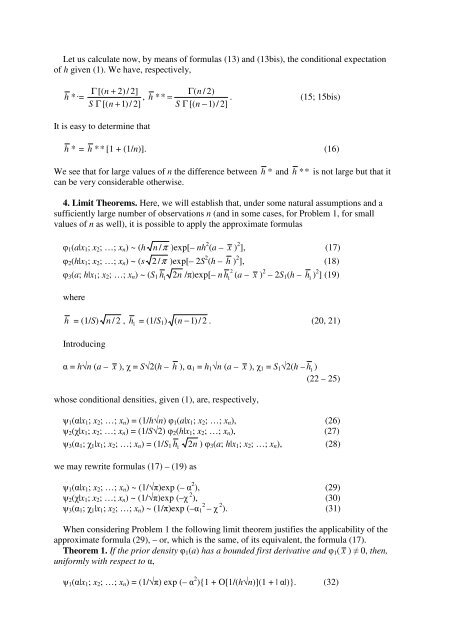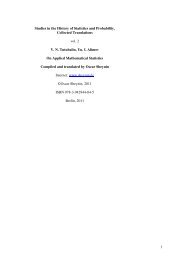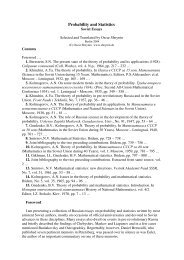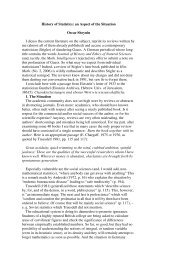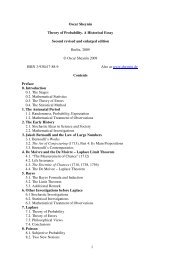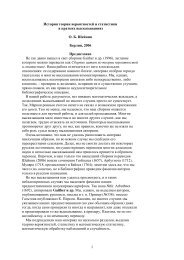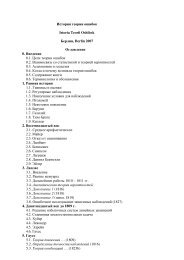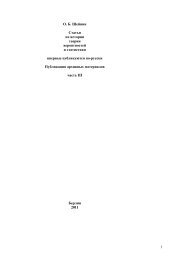- Page 3:
of All Countries and to the Entire
- Page 6 and 7:
(Coll. Works), vol. 4. N.p., 1964,
- Page 8 and 9:
individuals of the third class, the
- Page 10:
From the theoretical point of view
- Page 13 and 14:
Second case: Each crossing can repr
- Page 15 and 16:
On the other hand, for four classes
- Page 17 and 18:
f i = i S + i , i = 1, 2, 3, 4, (
- Page 19 and 20:
f 1 = C 1 P(f 1 ; …; f n+1 ), C 1
- Page 21 and 22:
ut in this case f = 2 , f 1 = 2 ,
- Page 23 and 24:
I also note the essential differenc
- Page 25 and 26:
A 1 23n1 + 1 A 1 A 1 … A 11A 2 A
- Page 27 and 28:
coefficient of 2 in the right side
- Page 29 and 30:
h(A r h - c h A r 0 ) = - A r0we tr
- Page 31 and 32:
Notes1. Our formulas obviously pres
- Page 33 and 34:
Bernstein’s standpoint regarding
- Page 35 and 36:
Corollary 1.8. A true proposition c
- Page 37 and 38:
It is important to indicate that al
- Page 39 and 40:
ut for the simultaneous realization
- Page 41 and 42:
devoid of quadratic divisors and re
- Page 43 and 44:
propositions (B i and C j ) can be
- Page 45 and 46:
A ~ A 1 and B = B 1 , we will have
- Page 47 and 48:
included in a given totality as equ
- Page 49 and 50:
For unconnected totalities we would
- Page 51 and 52:
proposition given that a second one
- Page 53 and 54:
On the other hand, let x be a parti
- Page 55 and 56:
totality is perfect, but that the j
- Page 57 and 58:
In this case, all the finite or inf
- Page 59 and 60:
probabilities p 1 , p 2 , … respe
- Page 61 and 62:
where x is determined by the inequa
- Page 63 and 64:
totality of the second type (§3.1.
- Page 65 and 66:
x = /2 + /(23) + … + /(23… p n
- Page 67 and 68:
that the fall of a given die on any
- Page 69 and 70:
infinitely many digits only dependi
- Page 71 and 72:
10. (§2.1.5). Such two proposition
- Page 73 and 74:
F(x + h) - F(x) = Mh, therefore F(x
- Page 75 and 76:
“confidence” probability is bas
- Page 77 and 78:
x1+ Lp n (x) x1− Lx1+ Lf(t)dt < x
- Page 79 and 80:
|(x 1 ; t 0 ; t 1 ) - 1 t0tf(t)dt|
- Page 81 and 82:
5. The distribution ofξ , the arit
- Page 83 and 84:
P(x 1i < x) = F(x; a i ) = C(a i )
- Page 85 and 86:
egards his promises. Markov shows t
- Page 87 and 88:
other solely and equally possible i
- Page 89 and 90:
notion of probability and of its re
- Page 91 and 92:
However, already in the beginning o
- Page 93 and 94:
the revolution. My main findings we
- Page 95 and 96:
Nevertheless, Slutsky is not suffic
- Page 97 and 98:
path that would completely answer h
- Page 99 and 100:
on political economy as well as wit
- Page 101 and 102:
scientific merit. Borel was indeed
- Page 103 and 104:
[3] Already in Kiev Slutsky had bee
- Page 105 and 106:
different foundation. The difficult
- Page 107 and 108:
5. On the criterion of goodness of
- Page 109 and 110:
--- (1999, in Russian), Slutsky: co
- Page 111 and 112:
Here also, the author considers the
- Page 113 and 114: second, it is not based on assumpti
- Page 115 and 116: experimentation and connected with
- Page 117 and 118: Russian, and especially of the Sovi
- Page 119 and 120: station in England. This book, as h
- Page 121 and 122: Uspekhi Matematich. Nauk, vol. 10,
- Page 123 and 124: variety and detachment of those lat
- Page 125 and 126: 46. On the distribution of the regr
- Page 127 and 128: 119. On the Markov method of establ
- Page 129 and 130: No lesser difficulties than those e
- Page 131 and 132: Separate spheres of work considerab
- Page 133 and 134: 10. Anderson, O. Letters to Karl Pe
- Page 135 and 136: Hier sind, im Allgemeinen, ganz ana
- Page 137 and 138: Jedenfalls, glaube ich erwiesen zu
- Page 139 and 140: werde ich das ganze Material in kur
- Page 141 and 142: considered as the limiting case of
- Page 143 and 144: and, inversely,] = m ...1 2 N[ ch h
- Page 145 and 146: µ 2 2 = m 2 2 - 2m 2 m 1 2 + m 1 4
- Page 147 and 148: (x k - x k+1 ) … (x k - x +) = E(
- Page 149 and 150: the thus obtained relations as pert
- Page 151 and 152: [1/S(S - 1)(S - 2)][(Si = 1Sx i ) 3
- Page 153 and 154: ( N −1)((S − N )(2NS− 3S− 3
- Page 155 and 156: µ 5 + 2µ 2 µ 3 = U [S/S] 5 + 2U
- Page 157 and 158: case, the same property is true wit
- Page 159 and 160: It follows that the question about
- Page 161 and 162: then expressed my doubts). And Gned
- Page 163: For Problem 1, formula (7) shows th
- Page 167 and 168: ϕ′1(x)1E(a|x 1 ; x 2 ; …; x n
- Page 169 and 170: Theorem 3. If the prior density 3
- Page 171 and 172: P( ≤ ≤ |, 1 , 2 , …, s )
- Page 173 and 174: 6. A Sensible Choice of Confidence
- Page 175 and 176: 0 = A 0 n, = B2, = B2, 0 = C 0 n
- Page 177 and 178: Note also that (95),(96), (83),(85)
- Page 179 and 180: Γ(n / 2)Γ [( n −1) / 2]k = (1/2
- Page 181 and 182: f (x 1 , x 2 , …, x n ) = 1 if x
- Page 183 and 184: and the probability of achieving no
- Page 185 and 186: E = kEµ. (14)In many particular ca
- Page 187 and 188: a = np, b = np 2 = a 2 /n, = a/nand
- Page 189 and 190: with number (2k - 2), we commit an
- Page 191 and 192: (67)which is suitable even without
- Page 193 and 194: " = 1/[1 - e - ], = - ln [1 - (1/
- Page 195 and 196: Such structures are entirely approp
- Page 197 and 198: 11. As a result of its historical d
- Page 199 and 200: exaggeration towards a total denial


